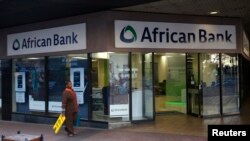A consumer credit boom in South Africa has trapped millions in swirling debt. The country’s debt problem came to a head in August when the Central Bank and commercial lenders had to rescue African Bank from a flood of bad debts - mostly racked up on risky unsecured loans. The bailout placed a spotlight on the rapid growth of unsecured lending in South Africa.
Under apartheid, racial inequality left the majority of South Africans without access to banks. The 1994 transition to democracy set off a boom in consumer credit as many banks, most notably African Bank, offered loans to blacks for the first time.
But 20 years later African Bank was overcome by unsecured debt, loans obtained with little or no collateral, taken out by its core market of low-income borrowers, who defaulted due to chronic unemployment and rising fuel and food costs.
Ian Wason, CEO of Debtbusters, a debt management service, said that despite noble intentions the bank ultimately did a large amount of harm.
“The premise that African Bank started out with was good. But what it turned into was very, very evil; and exploited unsophisticated, uneducated consumers - and far from socially uplifting the country they have actually caused huge damage,” said Wason.
In October 2013, African Bank was fined $2 million by the National Credit Regulator for reckless lending to consumers with inadequate means to repay loans. The bank pressured uneducated customers to take on bigger loans than they asked for and in some cases gave additional debt to defaulters, a regulation source told VOA.
Debt counselors contend that irresponsible lending is rampant in South Africa.
South Africa’s total personal debt is $135 billion, an average of $6,356 for each of the country’s 20 million credit active people. Almost half struggle to meet repayments, according to South Africa’s credit regulator.
A glut of poor South Africans looking for a better life after living through oppressive white-minority rule has pushed up demand for credit, said Wason.
“The vast majority of that money went into consumption. It did not go into developmental credit or buying a house or buying a car to get to work or run your business. It was just all spent on consumption. All of that money is drained into the retailers’ pockets and has kept South Africa’s GDP artificially high,” said Wason.
Mining communities have been particularly vulnerable to unscrupulous micro-lenders. One platinum miner was paying back $1,885 on his initial $94 loan, according to investigations by the regulator.
Debt Counselors Association of South Africa president Paul Slot called the growth in short-term pay-day loans “alarming."
“We have just come through a heavy strike action, prices are continuing to increase, inflation is sitting a little bit above 6 percent, so the group of people who are over indebted, or have high debt repayments actually need to become much more proactive in improving their situation, but they are doing very little,” said Slot.
Slot said it is not unusual for some borrowers to have more than a dozen credit agreements, often lying on applications about their current debt.
An effort to strengthen current lending legislation is underway. New guidelines will make credit disclosures by the consumer compulsory, and will force credit providers to conduct better background checks to ensure borrowers are not already swimming in debt.
Wason is predicting South Africa is in for more pain.
“What happens when you suddenly turn the taps off, which is what is happening now? Well, you have got a disaster on your hands, not only from the consumer’s point of view because they cannot keep rolling debts, but also from a country-wide point of view - the retail sales are going to drop through the floor,” said Wason.
That can only further hurt an economy weighed down by the heavy weight of consumers' substantial and growing personal debt.




